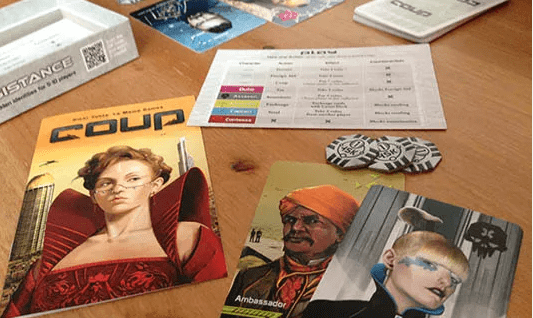Introduction to Coup
The game I played this week is Coup, a social deduction card game created by Rikki Tahata in 2012. This game is designed for 2-6 players but is more enjoyable with 4-6 players to create enough complexity to make the social deduction aspect fun. Coup can be played by a group of both strangers or friends with its lack of required intimacy and by both older kids (old enough to be able to deceive and deduce) and adults alike.

Breaking Down the Gameplay
Players:
Coup is a multilateral competition, where every player is out for themself. This is similar to the social deduction game “Clue” where every player is trying to figure out how the murder occurred before the other players. In Coup, players are trying to deduce what roles other players have. However, unlike Clue, the end goal of the multilateral competition is not to use the social deduction to determine the truth but rather to use the truth to be the last man standing.
Because every player is ultimately trying to outlast the other players, this creates interesting player dynamics as people form loose alliances to “take down” other players and these alliances shift as the number of players still in the game dwindles. A player who may start out playing conservatively in the beginning, avoiding killing people or stealing from people, may quickly become aggressive as others are killed off from the game. The shifting player dynamics and changing social interactions encouraged by the multilateral competition of the game creates the fun of fellowship, building bonds between all members of game. The fellowship created by multilateral competition is something my team is looking to emulate in our social deception game, having every player compete against one another but needing navigate complex social interaction in order to win.
Rules & Procedures:
In Coup, no one knows the two roles any other player has, similar to other social deduction games like Mafia or Spyfall. As a result, you can either take an action of one of your roles or lie about a role you have and take a different action. Thus, any player can be lying at any time, adding the social deduction aspect to the game.
When a player deducing that another player is lying, that player can call them out. However, to avoid other players always calling one another out, Coup has a rule that if the player calling out the lie is wrong, that player loses a role. Players can openly discuss among one another whether they think that person is lying, but ultimately, one player has to take the responsibility of calling the lie.
The procedure of being able to lie creates a dynamic of discussion among players, everyone able to chime in and team up against the one player to decide if they’re lying, which creates the fun of fellowship—especially because every player has a turn being the player that is discussed while also having multiple turns joining their fellow players in discussion. The rule of losing a card when you guess wrong, however, creates a dynamic of risk. The rule raises the stakes of the social deduction, that in turn creates the fun of challenge and makes it even more difficult to figure out each others’ roles. In our group project, we hope to emulate these two elements of lying and risk—allowing any player to claim to have any role but risk being called out as well as risk doing to the calling out—to create the fun of fellowship and challenge.
Reflection on Gameplay
When playing with my friends, I hadn’t played coup before. I asked a lot of questions and played pretty conservatively, not calling people out on lying or attempting to kill anyone. I could leverage the social aspects of the game to subtly join in on targeting a certain player or instigate competition between two players. And by playing non-aggressively, others worried less about me, allowing me to slip under the radar until the end when I had two roles and many coins and could quickly eliminate the only other two people still in the game. And the group all had a laugh together about the situation—how the newbie was able to socially conform and slip under the radar and win—leading to more group bonding and fun of fellowship.
Something I might change about Coup is to increase the challenge of social deduction by maintaining the same level of difficulty of deducing roles throughout the game. As we played, it became easier and easier to figure out what roles other people had based on the roles that had already been shown and put in a separate pile. In particular, I had the ambassador and was able to see and trade two cards from the deck. As a result, by the end of the game, I knew exactly what cards were in the deck and felt no risk calling people out on lying. While some level of narrowing down makes the deduction more doable, it felt less challenging near the end when the stakes were even higher. Thus, as players died, if cards were placed back into the deck from which we can draw, the fun of challenge would still be maintained throughout the game.



